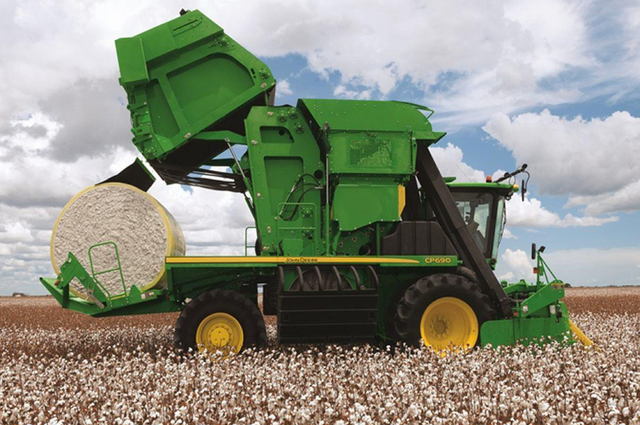Industry news
Sales of US cotton-harvesting machinery to China increase by 4,000 percent

Sales of US-manufactured cotton-harvesting machinery to China have increased by 4,000 percent, according to a report on the South China Morning Post website.
The news outlet says its own analysis shows that the increase in April of this year was “more than 4,000 percent” when compared with the same month last year.
The main reason for the dramatic increases, says the SCMP, is the possible threat of US sanctions against China which might make it impossible to import hi-tech goods.
SCMP studied the area of Xinjiang, western China, and says US agricultural machinery giant John Deere has a “heavy presence” there.
As quoted by SCMP, the manager of a government-owned John Deere showroom says the US company’s cotton-picking vehicles are “impeccable” and “super-efficient”.
He adds: “I am not saying the Chinese cotton pickers cannot replace John Deere at all, but Chinese brands have a high error rate and much lower efficiency; they cannot compete with John Deere.”
SCMP says Chinese customs statistics show that April 2020 brought an increase of 4,355.7 percent, to $117.8 million, of sales of hi-tech US cotton-picking machines. May 2020 was also a big month, racking up sales of $94 million.
By comparison, April 2019 saw sales of $2.65 million in the same category of machines.
John Deere, said to be the largest agricultural machine builder in the world, has been doing business in China for more than 40 years, but may have to stop if sanctions come in.
At a time when the agricultural sector is experiencing something of a technological revolution – with self-driving tractors and other vehicles as well as sensor networks monitoring soil, plants and pests, among other new “precision farming” methods – this is probably not a good time to cut off from China.
The US has a significant head start on many new precision agriculture technologies and is in a position to supply them to at a lower cost and in a shorter time frame than it would take for the Chinese to build their own.
But if sanctions prevent China buying from the US, the centrally-controlled communist state will eventually build its own versions of whatever technologies will make farming more efficient and productive.
John Deere, founded in 1837, has a market capitalization of around $60 billion and although its main markets are US and Canada, China is growing rapidly as a revenue stream.
At a time when the coronavirus pandemic has made all but food-related business “non-essential”, imposing sanctions to limit the burgeoning business in new and advanced technologies in the agriculture sector seems counter-productive on many levels.
China has reportedly floated the idea of banning some machinery imports from the US in retaliation for various American measures that affect Chinese businesses, but no clear sanctions have emerged.
In the early quarter of this year, and the tail-end of last year, Deere had reported a 4 percent in its net income, which cause its share price to go up by 7 percent.
According to the Financial Times, Deere’s positive performance was the result of the “relaxation of US-China trade spat” at that time.
Now, a few months on, with the plandemic bringing everyone down and the US-China trade war intensifying, it’s inevitable that economic analysts and likely Deere itself will cut the company’s outlook going forward.
Categories
News
Contact Us
Contact: Agriculture Machinery Parts
Phone: 86(0)15869109368
Tel: 86-571-89967020
E-mail: dawopu@gmail.com
Add: Hangzhou City Zhejiang Province China